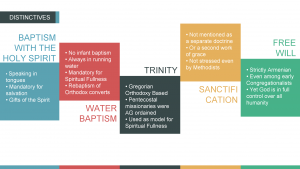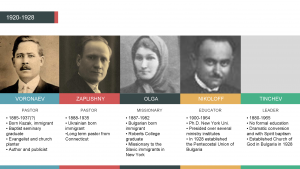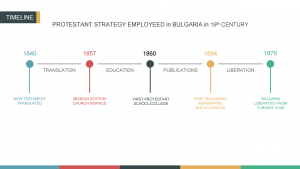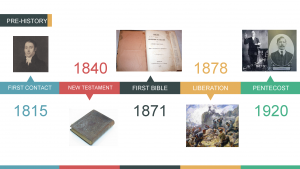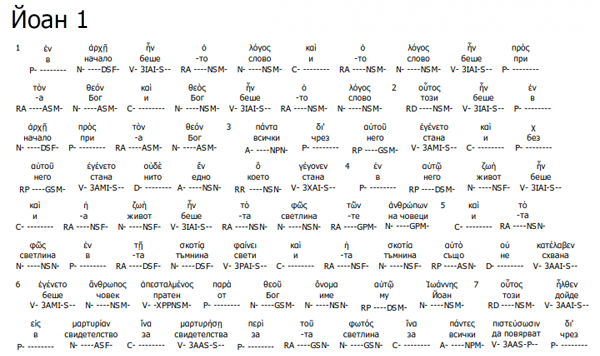Water Baptism among early Bulgarian Pentecostals
Historical and Doctrinal Formation of Holiness Teachings and Praxis among Bulgarian Pentecostals (Research presentation prepared for the Society of Pentecostal Studies, Seattle, 2013 – Lakeland, 2015, thesis in partial fulfillment of the degree of D. Phil., Trinity College)
The sacrament of water baptism was not new for Bulgarian believers. But Pentecostals did NOT accept infant baptism. Converts who were baptized as babies or any other Eastern Orthodox ritual were re-baptized before being received in the church. Among early Bulgarian Pentecostals, baptism was always done outside in “running water.” It was also considered mandatory for salvation as Bulgaria’s early Pentecostals insisted on spiritual fullness including: (1) salvation, (2) water baptism and (3) baptism with the Spirit. This formula of spiritual experience satisfied the witness of blood, water and Spirit (1 Jn. 5:8) on earth and corresponded with the triune God in heaven (1 Jn. 5:7), from whom the believer’s spiritual experience originated.
First Pentecostal Missionaries to Bulgaria (1920)
Historical and Doctrinal Formation of Holiness Teachings and Praxis among Bulgarian Pentecostals (Research presentation prepared for the Society of Pentecostal Studies, Seattle, 2013 – Lakeland, 2015, thesis in partial fulfillment of the degree of D. Phil., Trinity College)
Interestingly enough, the arrival of the first Pentecostal missionaries to Bulgaria was not associated with starting new churches. Neither was it purposing a takeover of existing protestant congregations or the traditional for Bulgaria Eastern Orthodoxy. First Pentecostal missionaries Voronaev (far left) and Zaplishny served as a pastor in the United States, but their goal in Bulgaria was to preach Pentecost in already established churches. Zaplyshny’s wife Olga, who was from Bulgaria, enjoyed her home church which was more than sufficient for the hand full of believers.
It was common in 1920 that whole congregations of traditional protestant churches in Bulgaria would convert to Pentecostalism. However, it was not until almost a decade later when in 1928 the nephew of Olga Zaplishny – Nicolas Nikoloff who was educated in the States was sent by the Assemblies of God to organize the Pentecostal movement in Bulgaria. Initially only 7 congregations agreed to his proposal to be included into the new Pentecostal Union and registered with the government. They were predominantly in Southern Bulgaria around the city of Bourgas where the Zaplishny family settled and labored. The rest remained under the leadership of Stoyan Tinchev (far right) calling themselves Free Church of God. They later formed churches in North Central Bulgaria, near the city of Varna where Voronaev resided.
Less than a decade old, the Bulgarian Pentecostalism movement split between the churches that registered with the government and the churches which refused to register. There were some later differences in their view on sanctification, Baptism with the Holy Spirit, leadership and organizational structure. Nevertheless, the preaching of Pentecost became the entry point for Spirit baptism among mainline churches and new converts.
The gifts of the Spirit were also contributing their part in the work. A well known example, in the first Baptist church in Bulgaria, the pastor’s daughter received the Holy Spirit and the whole church followed. And there are even some who suggest, that glassollalia had been previously experienced by some orthodox mystics in Bulgaria as related to the Russian Molokans from the Romanina city of Tulcha. With all this evidence, the baptism with the Holy Spirit was viewed as mandatory for salvation among early Bulgarian Pentecostals. Along with salvation and water baptism, it became known as “the fullness” of spiritual experience. One could not go to heaven without “the fullness!”
Protestant Strategies in Bulgaria during the 19th Century
April 20, 2015 by Cup&Cross
Filed under Featured, News, Publication
Historical and Doctrinal Formation of Holiness Teachings and Praxis among Bulgarian Pentecostals (Research presentation prepared for the Society of Pentecostal Studies, Seattle, 2013 – Lakeland, 2015, thesis in partial fulfillment of the degree of D. Phil., Trinity College)
The early Bulgarian protestants were mainly Methodists and Congregational. They followed the strategy of the American and British missionaries, which began with a translation of the Bible in the 1840s, followed by the first mission stations and protestant services in the 1850s.
In the following decade, Protestant schools were established in over a dozen Bulgarian cities. A broad stream of educational publications were translated and provided to schools, churches and the open public. The final goal of the missionary strategy was the establishing of churches, which began in the 1870s and continued onward.
The main sources of influence were the American Board of Commissioners for Foreign Missions (setup in Boston) with its local centers in Turkey and then Bulgaria; as well as from the British and Foreign Bible Society which also had centers in Constantinople and its main Slavic arm through the Russian Bible Society based in St. Petersburg.
Additionally, Baptists entered Bulgaria with their own mission work in 1875 and the Adventists in 1891. Although there were no Presbyterians churches in Bulgaria at that time, many of the agents sent by American Board of Commissioners for Foreign Missions were in fact Presbyterian and were educated at Princeton and Drew along with many Bulgarian protestants who studied abroad.
With all these key players present, Bulgaria was eventually introduced to the rise of Higher Criticism (1880–93) and consecutively to the movement to revise the Westminster Confession of Faith (1900–1910). It was met with great resistance among Bulgarian churches. In this context, the search for holiness among Bulgarian evangelicals began at turn of the 20th country not only as an alternative to the liberal theological thought and praxis, but as a move toward a renewed spiritual identity, which ultimately became the channel for introducing Pentecostal-Holiness teachings.
Historical and Doctrinal Formation of Holiness Teachings and Praxis among Bulgarian Pentecostals
by Dony K. Donev, D.Min.
Historical and Doctrinal Formation of Holiness Teachings and Praxis among Bulgarian Pentecostals (Research presentation prepared for the Society of Pentecostal Studies, Seattle, 2013 – Lakeland, 2015, thesis in partial fulfillment of the degree of D. Phil., Trinity College)
Protestant work in Bulgaria began in 1815 when agents of British and Foreign Bible Society, Robert Pinkerton (1780-1859) and Benjamin Barker (d.1859), initiated a search for Bible translators in the spoken Bulgarian vernacular. As a result a new translation of the New Testament in Bulgaria was published in 1840 and the whole Bible in 1871.
By the liberation of Bulgaria from Turkish Yoke in 1878 Protestantism was well established in Bulgaria. Graduates from Protestant Robert’s College became prominent politicians in the new Bulgarian state. When the first Pentecostal missionaries arrived in 1920, they found a century old protestant tradition in Bulgaria.
Greek-Bulgarian Interlinear New Testament Based on the Nestle-Aland 28/ UBS-4
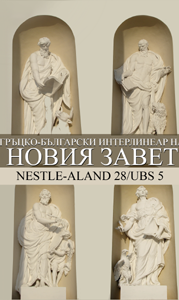 For Easter 2015, after over eight years of hard work and much difficulties, Cup & Cross Ministries was able to complete and publish the first ever Greek-Bulgarian interlinear based on the Nestle-Aland 28/ UBS-4 texts. This first edition is dedicated to those students of the Bible, who prefer working with the original texts, rather than using the multitude of new Bible revisions often with religious and ideological orientation. More information about this publication is available at: [Amazon.com]
For Easter 2015, after over eight years of hard work and much difficulties, Cup & Cross Ministries was able to complete and publish the first ever Greek-Bulgarian interlinear based on the Nestle-Aland 28/ UBS-4 texts. This first edition is dedicated to those students of the Bible, who prefer working with the original texts, rather than using the multitude of new Bible revisions often with religious and ideological orientation. More information about this publication is available at: [Amazon.com]
The Everlasting Gospel: The Significance of Eschatology in the Development of Pentecostal Thought
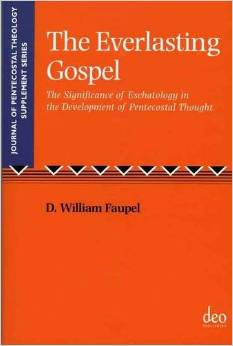 The Everlasting Gospel: The Significance of Eschatology in the Development of Pentecostal Thought by D.W. Faupel follows the following outline:
The Everlasting Gospel: The Significance of Eschatology in the Development of Pentecostal Thought by D.W. Faupel follows the following outline:
- The Pentecostal Message: In this chapter Faupel explores the pre-formation of the Pentecostal message. He relates its content to the Full Gospel, which includes: salvation, sanctification, baptism with the Holy Spirit, healing and second coming.
- Context of Pentecostal Thought: In this chapter Faupel gives a brief sketch of the American context at the end of the 19th century. His focus on the American culture as ground for Pentecostalism, however, seemed quite narrow especially in retrospect to the original glassolalia experience by the disciples on the Day of Pentecost.
- The Pentecostal Message: Faupel offers an interesting observation on the lives, messages, ministries and outcomes of three major pre-Pentecostal American figures. He writes of J.A. Dowie. Frank W. Sandford and Charles Parham.
- The Coming of the Latter Rain: Faupel begins the story of Seymuor as a continuation of the historical formation of the Pentecostal Movement linking it back to the ministry of Parham. He explores the beginning of the Azusa Street revival and its affect on Los Angeles, the United States and worldwide.
- Defining the Parameters of Pentecostal Though: The end of Faupel’s story focuses on the outcomes of the Latter Rain phenomenon. Main concern of the plot is the ministry of Durham in Chicago, who proposes the idea of Finished Work. Durham claims that thought Calvary there are only two works of grace, the salvation experience and the baptism with the Holy Spirit. The sanctification, he proposes, comes in the life of the believer through the salvation experience.
European Delights: A Sweet Journey Through Europe
 Cakes, cookies, custards, puddings, candies, fried dough, pies and pastries. From the unconventional, recipes of Albanian Walnut Lemon Cake and Lithuanian Poppy Seed Cookies to the classic Tiramisu and Macaroon recipes, this cookbook takes your taste buds on a sweet journey throughout Europe. Desserts have come a long way since the dried fruits of the ancient civilizations as the first candies to soufflés and cakes once sugar began to be manufactured in the Middle Ages. This cookbook contains some of both the simple and more advanced recipes of Europe. It features 40 authentic dessert recipes representing nearly every European country and with each recipe there is a story to tell. The word “dessert” originated from the French word desservir “to clean the table” and these delights will make you want to clean your table a bit faster.
Cakes, cookies, custards, puddings, candies, fried dough, pies and pastries. From the unconventional, recipes of Albanian Walnut Lemon Cake and Lithuanian Poppy Seed Cookies to the classic Tiramisu and Macaroon recipes, this cookbook takes your taste buds on a sweet journey throughout Europe. Desserts have come a long way since the dried fruits of the ancient civilizations as the first candies to soufflés and cakes once sugar began to be manufactured in the Middle Ages. This cookbook contains some of both the simple and more advanced recipes of Europe. It features 40 authentic dessert recipes representing nearly every European country and with each recipe there is a story to tell. The word “dessert” originated from the French word desservir “to clean the table” and these delights will make you want to clean your table a bit faster.


